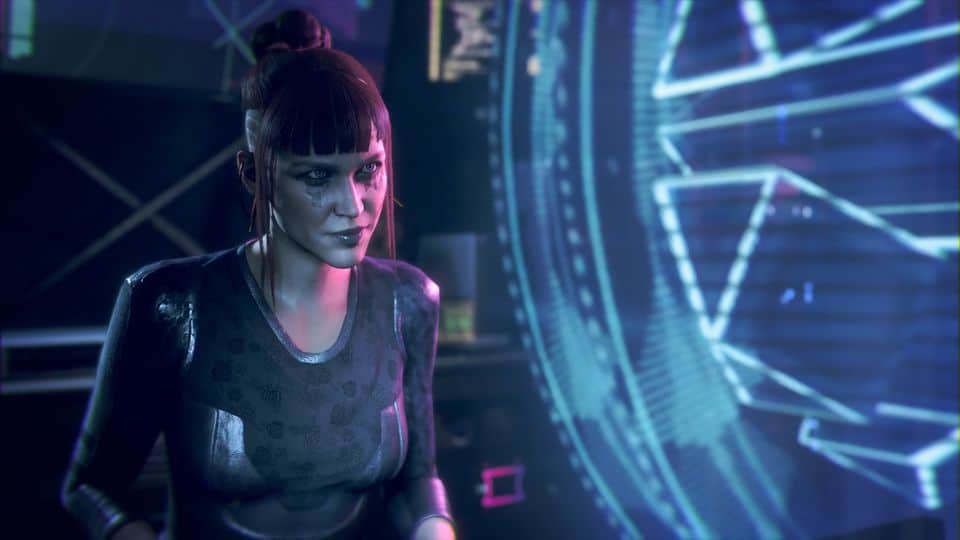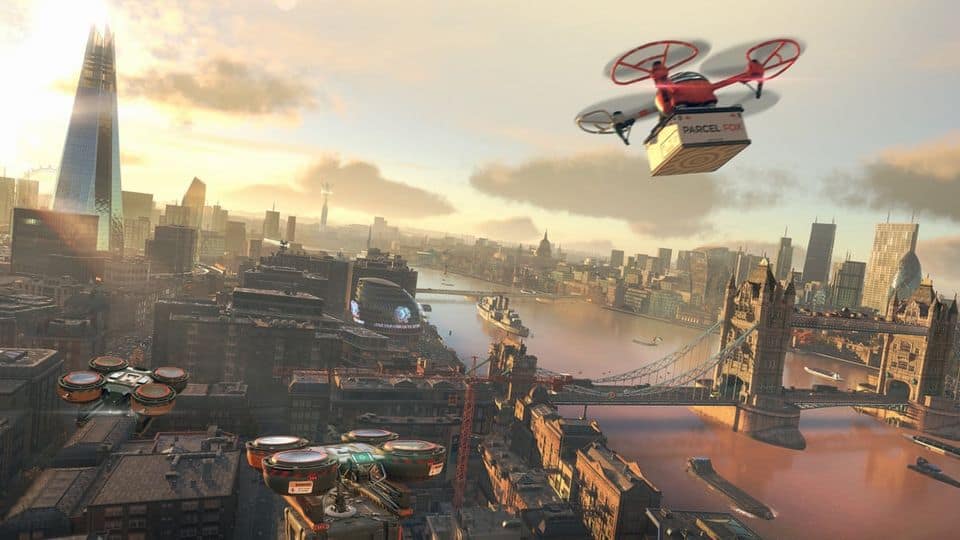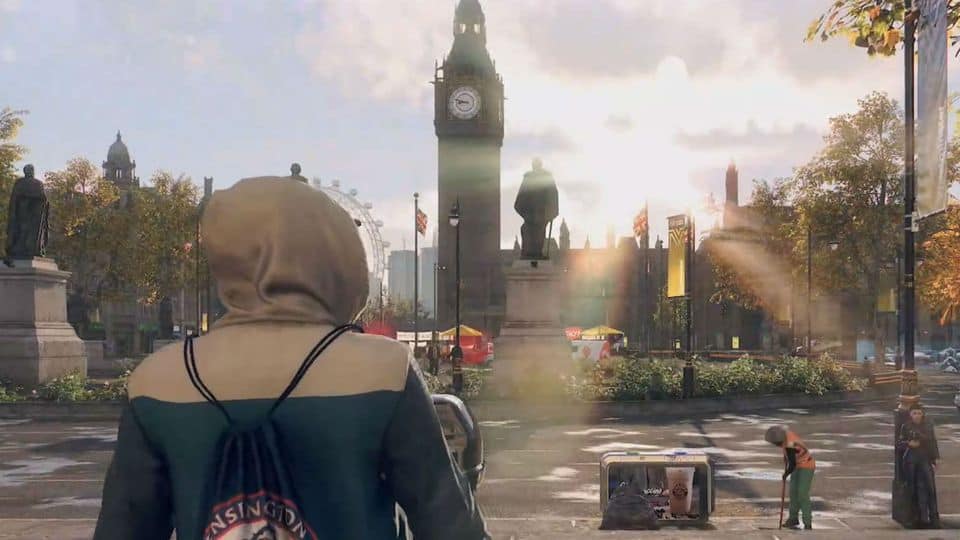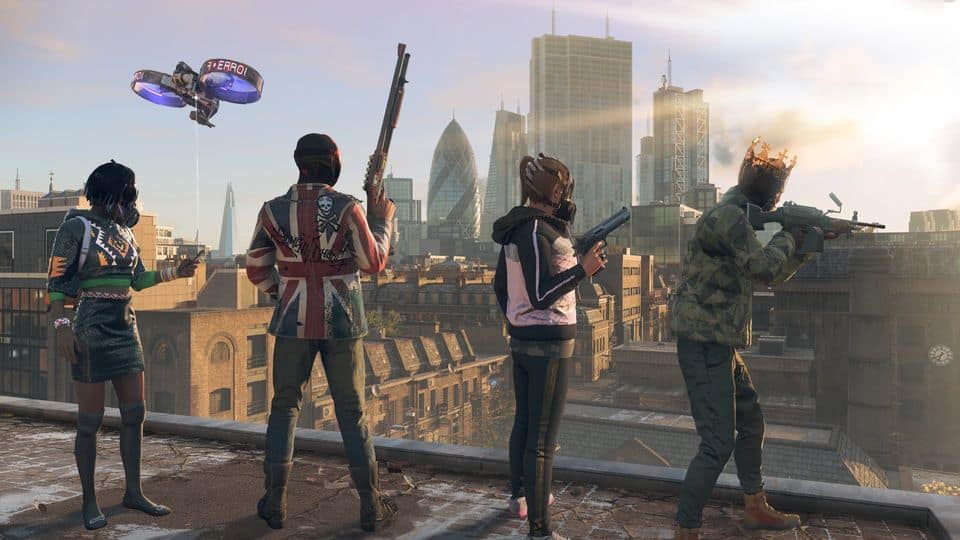Watch Dogs: Legion review (original) (raw)
You can trust VideoGamer. Our team of gaming experts spend hours testing and reviewing the latest games, to ensure you're reading the most comprehensive guide possible. Rest assured, all imagery and advice is unique and original. Check out how we test and review games here
As Egan Magee crouched atop a freshly hijacked drone, cruising through the drizzle over Regent Street, I came to the conclusion that Watch Dogs: Legion was, all things considered, a relief to leave behind. It was quiet up there. Away from the holographic advertisements, which hang crackling above the buildings like a migraine. Far from the madding crowd of bad accents and worse clothes that make up the general population. And high enough that you can squint through the near-future glaze of LED and plastic, and make out the old stone beneath, like unsnaring a pine tree from its Christmas trappings. When one character says, by way of a rousing call to arms, “Let’s unfuck London,” I almost cheered.
The rouser is Sabine, who looks, with a bluntly chopped fringe and a generous caking of eye shadow, like Lisbeth Salander, the heroine of The Girl with the Dragon Tattoo. She is a prominent figure in the London branch of DedSec, a cabal of computer hackers. We see her at DedSec’s headquarters—a dim grotto, furbished with graffiti—on a screen. She is “hiding out in the North,” after DedSec was blamed for a series of bombings across the city, and many of its members were killed or arrested. Egan, a red-haired Irishman, is one of many interchangeable recruits within DedSec, hence the “Legion” of the title. I chose him because of his unhackable firewall of beard and his weakness for old-fashioned hardware—he carries a 9mm pistol. The unfucking concerns Albion, a private military contractor hired to protect the streets from perceived terror threats. Needless to say, Albion’s protection amounts to a boot stamping on every human face—forever, if its CEO, Nigel Cass, has his way.

In short, the country has gone to the dogs. A rabid, slavering pack comprising Mary Kelley, a human trafficker draped in leather, pearls, and cigarette smoke—think Cruella de Vil, but swap the puppies for panicked humans. Then, there is Cass, of course, who dreams of plating London with armour, both digital and physical, and damn the cramped and sweaty souls inside. And we also have Skye Larsen, a tech company CEO who thinks that life would be a lot better—enriched with a limitless silver lining—if we uploaded our brains to the cloud. She may have a point. Note the way that the major players, good and bad, are organisations, armed with money, manpower, and an agenda, as if any group effort, be it democracy or a street-level uprising, were destined for the corporate. Success depends not on your beliefs but on how deeply you are hooked into the network, and how ubiquitous your software.
“Tyranny isn’t an idea, it’s an institution. Boots, paper, plumbing,” Egan muses, in an exchange with a whistleblowing journalist. (There is an odd naïveté to the narrative, as though the citizens of London hadn’t tuned out the sound of blowing whistles long ago, and all they needed was a wakeup call.) The writing, led by Cameron Labine is a chewy mixture of the politically charged and the broadly unfunny: “What we need to do now is clash with the fuckers who is exploiting London.” The main draw, however, is not the plot or its capacity to inspire but the setting: the glorious, rain-coloured capital. This marks the first big-budget open-world attempt at recreating the place since developer Ubisoft’s previous visit, during the industrial revolution, in Assassin’s Creed Syndicate. Not an awful lot has changed.

True, the streets no longer echo with the hoofbeats of horses, and the skyline is no longer dominated by chimneys, letting out their smokey sighs, but by spires of steel and glass. Other than that, though, you still move from borough to borough (there are eight in total, tucked and trimmed for the sake of consolidation), liberating the great unwashed from the weight of oppression. And you still go through the same motions of side missions, of de-fogging the map, and of sabotage. For Ubisoft, the open world isn’t an idea, it’s an institution. Collectibles, zones, objective markers. And I can’t help but feel that we’re being sold a stale template in an exciting skin. I went, in a handful of hours, from dutiful amazement, as I homed in on my own real-life hotspots—the cafés, the pubs, the bookshops, or, at least, the places they would be—to boredom and mild resentment, as the design and the mechanics numbed my appetite and hobbled my exploration. I began to clash with the developers who is exploiting London.
For a start, given that Ubisoft Reflections—the studio behind the Driver series—has worked on it, I see no reason for the cars to feel as crummy as they do. Be they bulky black cabs or low and lithe Aston Martin knock-offs, they are all weightless and jerky, and the camera lollops after them round corners like a labrador. Most of the time, seeking peace, I would set a waypoint and turn on the auto-drive function, watching the wet pavements stream past as the game played itself. Maybe one day all games will be like this, the glitch of human input patched out of them, and we’ll stare as their gleaming systems go by.

Then, there is the map. And it really is a map. After an hour, you’ll know precisely what gnawed at William Blake, in the poem “London,” when he wrote, “I wander thro’ each charter’d street / Near where the charter’d Thames does flow.” Thank God he never got his hands on Watch Dogs: Legion. There is something about the way that Ubisoft builds its open worlds—in which nothing seems to flow and everything feels charter’d—that I think would drive Blake deeper into that fevered boredom. At first, I figured that the game’s HUD was simply obnoxious—the strips of searing blue chevrons that coil above the roads, the thin white threads that spin out from your character like a spiderweb, indicating all that can be hacked—but then I was hit with a deeper realisation. Perhaps the onscreen clutter was, in fact, a clue: that the only presence in the game capable of changing the way we see the world is an operating system.
Certainly, there are none in the drab ranks of DedSec to inspire us. Whenever Sabine talks, she seems to teeter on the brink of righteous tears. Egan prefixes most of his sentences with swear words. And I spent most of the time playing as Tobias, a Bond-esque boor, purely because he was the least irritating—granted, the gadgets (an EMP-emitting watch and a cloaking car) played a part. Much has been made of the fact that you can convert anyone on the street to the cause, bringing with them unique abilities. But I found little fun in doing so. There is no Mother Base to build up, like there is in the Metal Gear Solid series, no sense of hearts and minds being coaxed out of lethargy into action, merely the prospect of new perks, so I relied on the same three or four characters throughout.

Where the action comes alive is in the leaving behind of bodies altogether. Most missions involve breaking and entering into the technophilic strongholds of various organisations, and the thrill lies in the absence of any breaking. Hopping between CCTV camera feeds, you sail through the walls, feasting on the innards of laptops and scraping data from the surfaces like dust. Elsewhere, you pilot robotic spiders through silvery-black server rooms that resemble Borg cubes, or hover above the heads of your foes, in a mini-drone, sniffing the passwords from their phones. These glimpses into the fleshless future of espionage are all the more troubling for their ease and fun. And if you crane your view back to catch sight of your character, you find them standing, near-redundant, head fixed on their phone, reduced to a blue outline—a ghost in the machine.
Indeed, the irony of Watch Dogs: Legion is its strange refusal to confront the role of the humans at its heart. When Egan, appalled at the state of the state, says, “We’re living in big brother and no one even knows it,” you think, Oh come on, Egan, everyone knows it! The dark secret is that they half invited it, and quite what the hackers of DedSec would do were the world to revert to paper and proper human contact I dread to think. The creative director here is Clint Hocking, who happens to have made one of the finest, and most physical, stealth thrillers ever, in Tom Clancy’s Splinter Cell: Chaos Theory. In that game, crisis was averted by Sam Fisher, pessimism made flesh—a grizzled lone operative with a warm gun in his hand. And I kept hoping, down in Albion, that some dark corner of the ceiling would harbour a weary Sam, waiting to descend and save the people from themselves.
Developer: Ubisoft Toronto
Publisher: Ubisoft
Available on: PlayStation 4 [reviewed on], Xbox One, PC, PlayStation 5, Xbox Series S / X, Google Stadia
Release date: October 29, 2020
To check what a review score means from us, click here.
About the Author

 verdict
verdict
Where the action comes alive is in the leaving behind of bodies altogether. Most missions involve breaking and entering, and the thrill lies in the absence of any breaking.
5 London Hacking infiltration Writing Open-world design
Subscribe to our newsletters!
By subscribing, you agree to our Privacy Policy and may receive occasional deal communications; you can unsubscribe anytime.